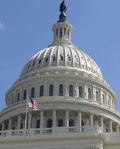
ASTMH was pleased to co-host a well-attended reception on Capitol Hill on May 7 in honor of World Malaria Day. Kenneth Staley, MD, U.S. Global Malaria Coordinator, led off the remarks at the event. Sen. Chris Coons (D-DE), Sen. Roger Wicker (R-MS), and Rep. Chris Smith (R-NJ), co-chairs of the Congressional Malaria and NTD Caucus, and Sen. Patrick Leahy (D-VT), Ranking Member of the Senate Appropriations Committee also spoke at the event (note: having three, or even one Member of Congress attend an event is extraordinary and shows their high level of support). Dr. Jimmy Opigo, Assistant Commissioner for the National Malaria Control Division at the Uganda Ministry of Health and National Malaria Control Program Manager, offered remarks as well.
The House of Representatives has started to dig down into the fiscal year 2020 funding levels, starting with the bill that funds health agencies like NIH and CDC. On May 8, the House Appropriations Committee passed their version of the fiscal year (FY) 2020 Labor, Health and Human Services, Education, and Related Agencies (LHHS) bill by a 30-23 party-line vote. The bill includes an increase of $2 billion for NIH and an increase of more than 11% in CDC funding. Other accounts supporting global health within NIH and CDC also saw boosts: a $285 million (5 percent) increase to NIAID, a $6.8 million (8 percent) increase to the Fogarty International Center, a $25 million (5 percent) increase to the CDC Center for Global Health, and a $24.25 million (4 percent) increase to the National Center for Emerging and Zoonotic Infectious Diseases. But remember, this is only a first step in a very long process and these funding numbers are likely to change before they are finalized.
On May 10, the House Appropriations Subcommittee on State and Foreign Operations considered their version of the bill that funds the Department of State and USAID. The bill contains an increase for State and USAID global health funding in the bill but details on specific accounts are not yet available.
In the Senate, appropriators continue to hold hearings on agency or department specific budget requests.
On May 9, the Trump administration announced the development of a Global Health Security Strategy, which "defines the actions the administration will take to prevent, detect, and respond to infectious disease threats, whether naturally occurring, accidental, or deliberate.” The strategy has three key priorities, officials from the National Security Council, CDC and other agencies said on a conference call. The administration will focus on:
- strengthening partner countries' resources to fight infectious disease
- increasing international support to respond to global threats
- and protecting the homeland through better coordination among government agencies.